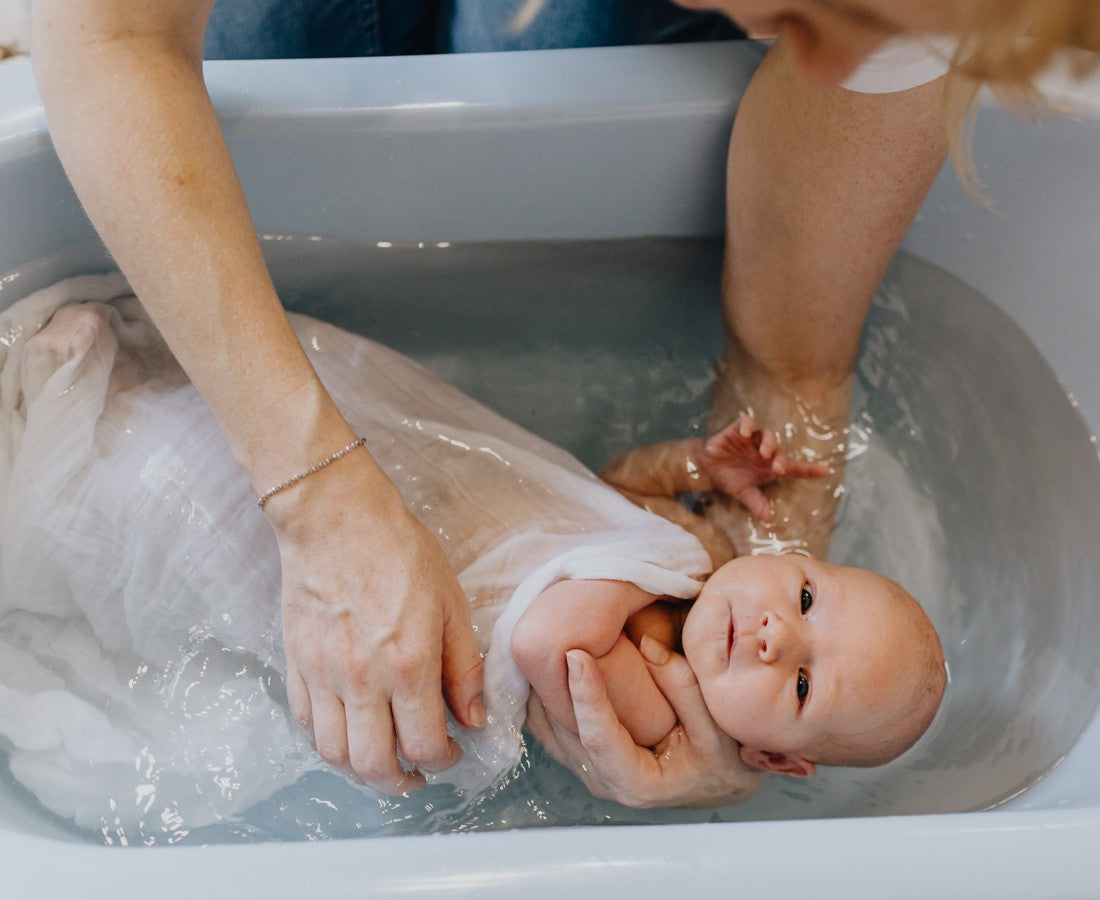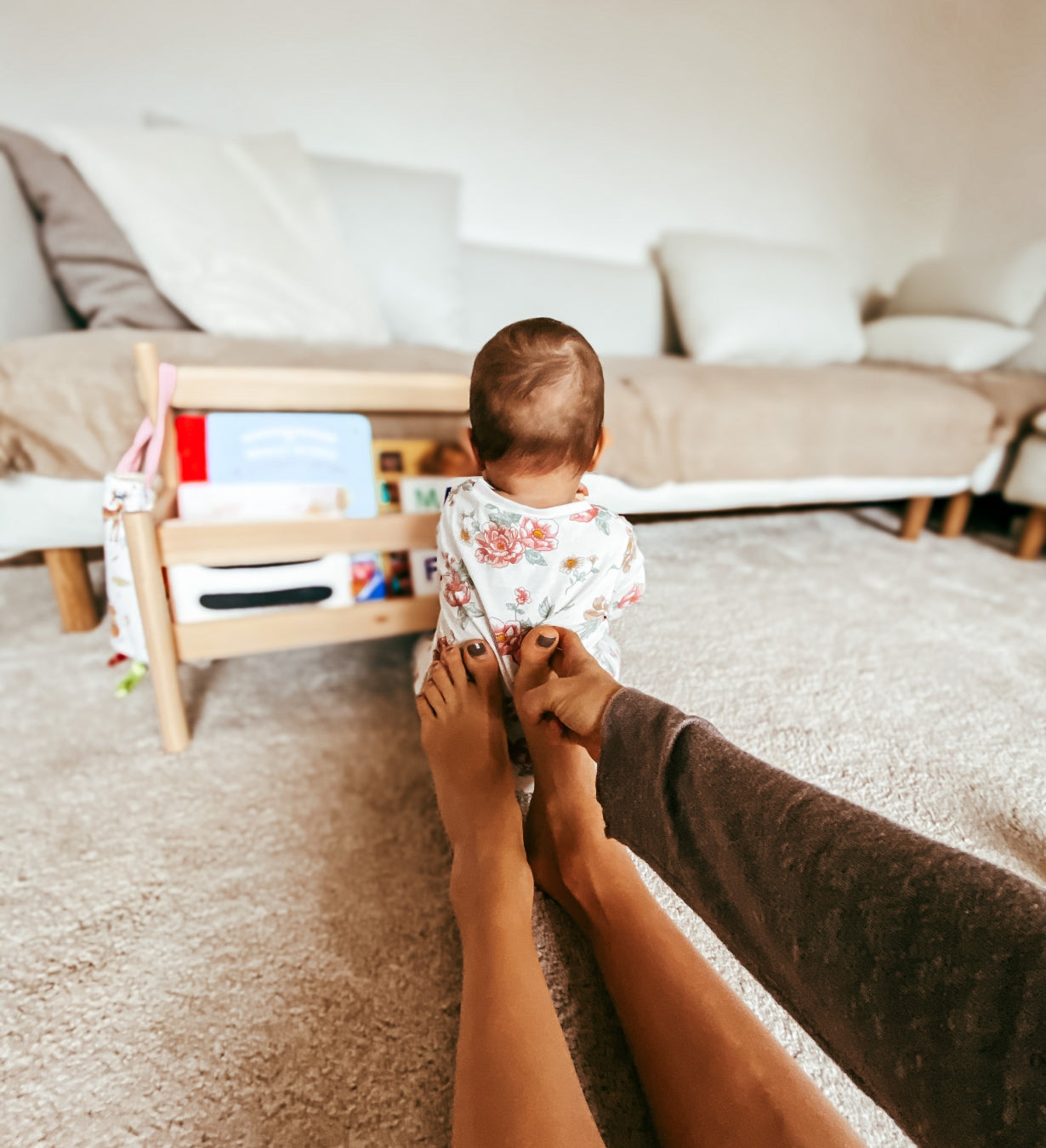For many parents-to-be, a big shopping trip to the drugstore is an integral part of preparing for their little treasure. But when you stand in front of the baby care shelf for the first time, the huge variety of products can quickly become overwhelming: disposable diapers, wet wipes, creams, powder, oil... But what do you actually need for your newborn baby?
With this article I would like to give you a few tips about sustainable care products for babies. Out of love for our children and nature, we should focus on sustainable, naturally fairly produced baby products when choosing care products!
Does baby skin need special care?
Your baby's skin is thinner than that of adults and its protective function is not yet fully developed. This means that it dries out more quickly and pollutants of various kinds can penetrate more quickly. This makes your baby's skin particularly sensitive, so the motto "LESS IS MORE!" applies.
Perfumed care products can cause allergies and skin irritations in your baby. Therefore, it is best to choose natural care products without fragrances and additives.
What products do I need for my baby?
The minimalist motto also applies to the number of products. In the first two to three days after birth, your baby is still covered in vernix, which protects against cooling and infections.
On the third day after birth, the first baby bath is usually carried out in the clinic together with the parents. However, this bath is about well-being - babies remember the security of the amniotic sac in the warm water - and not so much about body cleansing. The last traces of vernix caseosa in the skin folds are removed with a naturally pressed oil swab.
When you can finally enjoy your family happiness at home, a bath every 4 days with clear water or a dash of breast milk is completely sufficient. You can of course also bathe with the umbilical cord remnant. This must be dried very well after the bath.
Gentle cleansing with water and oil
It is important that you do not forget to clean your baby's skin folds. Sebum deposits and milk residue can quickly build up and severe redness can occur. Therefore, please clean skin folds once a day with an oil swab (cold-pressed almond oil, jojoba oil)!
Clean your baby's bottom every day with a washcloth and clear warm water. You can also add a little organic oil. This will ensure that all stool residue is thoroughly removed and no redness occurs.
You can easily replace wet wipes when changing diapers, especially at home, with gauze swabs and warm water (filled in a thermos flask). If you can't do without wet wipes, please use sensitive wipes with a high water content.
“Breast milk is truly a miracle cure and can be used for cleansing or instead of creams and ointments.”
Sore bottom, what now?
If it has gotten to the point where the little bottom is red and sore, you can help with a few home remedies. It is important that your baby's bottom is kept dry. It is best to let your baby kick around naked several times a day in a warm room.
Black tea as a multi-talent
Black tea or chamomile tea are true all-rounders when it comes to promoting wound healing and relieving redness in a natural way. Gentle cleansing with these additive-free teas can be used several times a day.
Healing wool against redness
The magic word for a sore baby bottom is healing wool. The wool contains lanolin and can soothe redness and inflammation, but should not be used on open or bloody areas on the bottom. Healing wool can be used for cleaning or placed in a dry diaper.
Breast milk as a panacea
Breast milk is very good for your baby's skin and health. Breast milk is truly a miracle cure and can be used for cleansing and as an alternative to creams and ointments.
miracle ointments
If you have a sore buttock, you cannot do without ointments. Creams and ointments that contain only natural ingredients are suitable. The active ingredients of almond oil, calendula or white mallow are excellent.
When should I still see a pediatrician?
If redness or wounds are still present after 2 to 3 days despite using home remedies, you should definitely see a pediatrician. You should also keep an eye on your baby's bowel movements. If your baby shows signs of pain, such as increased frowning, whimpering, crying and has a raised body temperature, please see a doctor immediately!
Do I need hair shampoo etc.?
You can also clean your baby's head and face with clean water in the first few months. You only need shampoos from the time the baby is eating, when food remains are hidden in the hair. A gentle baby brush is recommended for massaging the head. This also removes dead skin cells and stimulates hair growth.
In the winter months, it is recommended to use a wind and weather cream for the face. This should not contain any water so that the skin does not freeze in sub-zero temperatures.
If your baby's delicate nose is crusted due to a cold, it is best to use the corner of a tissue and gently twist it together to clean it. You can also put water or oil on the tissue. Nasal drops made from isotonic saline solution are ideal for gently cleaning or moistening a runny nose. Cotton buds do not belong in the nose or ears!!!
nail care
Many babies are born with long fingernails and toenails. However, the transition from nail to nail bed is very difficult to recognize at first, so you should refrain from cutting the nails in the first 4-6 weeks. The soft nails usually break off on their own. Later, you can use a rounded baby nail clipper to shorten the nails. On the hands, this may even be necessary several times a week, but toenails grow much more slowly. It is best to do a manicure with two people and your baby should be in a calm position when it is sleeping or being breastfed, for example.
I'd be happy to give you a checklist so that you don't feel overwhelmed in the drugstore. Since this list contains all the necessary care products for the first few months with your baby, you can still treat yourself to something nice. 😊
Your checklist for sustainable baby care:
- Some soft washcloths, cotton diapers, gauze swabs
- Naturally pressed vegetable oil
- Wind and Weather Cream
- Sensitive wet wipes
- Wound protection cream, teas, healing wool
- baby hairbrush
- Rounded baby nail scissors
As you can see, delicate baby skin doesn't need much. So don't let the multitude of products unsettle you and trust in nature.
I wish you many wonderful cuddly moments with your sweetheart!







Leave a comment
All comments are moderated before being published.
This site is protected by hCaptcha and the hCaptcha Privacy Policy and Terms of Service apply.